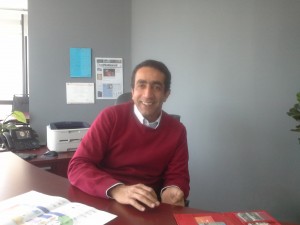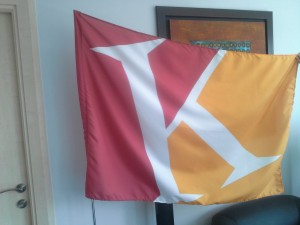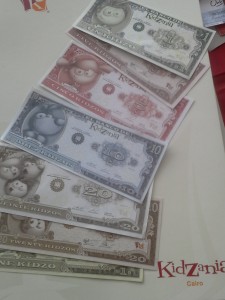
(Photo by Mohamed Salah)
The concept of “edutainment” may be new to Egyptian society, but it has been successful worldwide. With nine successful parks around the globe, an independent currency, a written constitution and a unique citizenship system, Kidzania, the first edutainment park for children, is coming soon to Egypt.
Daily News Egypt spoke with Tarek Zidan, the governor of Kidzania Egypt and the CEO of Edrak, the company which runs the project, to learn more about the project and to explore concept of edutainment, which mixes education and entertainment, so children can learn while having fun.
How did the edutainment concept arise?
The concept of edutainment is historical. Children have always enjoyed role-playing; in our childhood we all pretended to be policemen, doctors, or pilots.
We took this concept and we added an educational aspect, so while the child is pretending to be working at a supermarket, he actually learns mathematics. There is some knowledge behind it.
Do you expect this concept to have the same success in Egypt as in other countries?
There are currently nine Kidzania cities around the world, in Mexico, Portugal, Turkey, Chile and the United Arab Emirates.
Egyptian society is part of the wider Arab world, and it has a lot of similarities with Latin American and European societies as well, so I don’t see why the concept won’t work here; the idea is global in nature and not specific to a certain society or culture.

(Photo by Mohamed Salah)
Will this experience be accessible for the majority of Egyptian children?
In Kidzania all children are equal. The city will therefore be open to children of all classes, ranging from the ‘A++’ to ‘C1’ categories
The entrance fee will be affordable, and the park could be a destination for public school educational trips.
What is the business model behind Kidzania?
Kidzania has a multi-faceted business model; it acts on three different platforms.
Firstly, it is an educational and entertaining family experience. So while the kids are practising skills related to jobs they are interested in and gaining knowledge, parents can enjoy the outlets and restaurant facilities available at the centre.
Secondly, Kidzania is a media hub. It allows top brands to interact with their customers. International, regional and local brands can display banners and advertisements to visitors.
Finally, there is the corporate social responsibility (CSR) component. We can host children with special needs, and governmental and private entities can invite socially disadvantaged kids to spend the day having fun while learning.
The ticketing system is very basic; it’s operates on a single-admission basis, and the visitor pays only a single fee for the admission ticket and a Kidzania travellers’ cheque which can be exchanged for ‘Kidzos’, the centre’s currency.
After spending all their Kidzos, the child will have to choose a job and produce something to earn extra “cash”. This will help them to understand the value of work and money as well as basic financial concepts.

(Photo By Mohamed Salah)
What about adults?
Unlike children, adults cannot get work permits at Kidzania!
We consider them to be tourists, so they can do what tourists usually do in any other city: walk the streets, go sightseeing, and take pictures.
Only children can use the Kidzania currency; they can even apply for citizenship and hold the Kidzanian passport.
It’s like travelling to a different nation; you need a passport and boarding pass to go there and once you arrive you receive travellers’ cheques and city maps showing available jobs.
The citizenship qualifies the child to participate in political life within the city. He or she can become a member of the Kids’ Congress, which tells the management how the place can be improved and what needs to be added. He or she can also be an ambassador who speaks on behalf of the city.
In fact, the learning experience includes several political concepts. The Kidzania constitution contains a declaration of independence and lists the children’s basic rights. It also tells children what they can and can’t do within the city.
When is the project expected to start?

(Photo By Mohamed Salah)
We began working on the project in mid-2010. It was scheduled to open in October 2012, but we have faced a series of unexpected events since then: The 25 January revolution, the Sokhna port strike, which delayed the arrival of equipment, and the diesel crisis. We are not sure when the opening date will be, but we hope to open within the next few months.
These obstacles have not affected our desire to complete the project, however. So far we have invested $20m to $25m in total, and we are committed to investing further funds and energy in the Kidzania concept.




